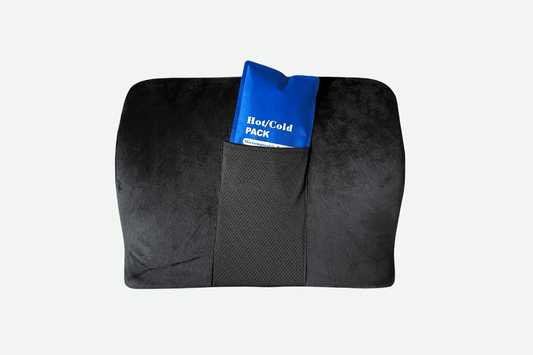Can Hemorrhoids Cause Cancer?
Robert Cutler, D.O., FAOCPrShare
Hemorrhoids are prevalent, treatable and widely considered a nuisance, with painful, itchy or bleeding symptoms in a hard-to-reach place. These symptoms can be cause for alarm, however, as many overlap with the warning signs of more serious diseases such as colorectal cancer (CRC) and anal cancer. It is natural to worry if these conditions are connected, and the question can hemorrhoids cause cancer is bound to arise. We’ll break down the importance of being knowledgeable and informed about symptoms of hemorrhoids, risk factors for people with hemorrhoids, and the necessity of seeking medical advice for any concerning signs.
Understanding Hemorrhoids
Hemorrhoids form a complex of soft tissue and veins that rest along the anal canal. When extra pressure is placed on the rectum (caused by pregnancy, obesity, strain from constipation and more), these veins become swollen and inflamed. The most common symptoms are soreness, itching and bleeding.
Many people first notice their hemorrhoids as painful, swollen blood vessels appearing around the rim of the anus. These external hemorrhoids can also form as purplish lumps or bumps that you can see and feel, and that cause a great deal of pain, itching and burning, making it difficult to sit down. Internal hemorrhoids are veins that have enlarged but remain inside the anus. These will not be visible but can still cause pressure, pain and bleeding (bright red blood on toilet paper or in the bowl).
The different types of hemorrhoids are both common – Americans self-reported 10 million cases per year.1 Both are also treatable using a combination of at-home and over-the-counter methods, from diet, exercise and proper hydration to ointments and creams that contain ingredients for numbing the pain, shrinking swollen tissues and protecting irritated skin from further harm. Prolapsed and bleeding hemorrhoids or any hemorrhoid that is resistant to treatment, increases in symptom severity or significantly disrupts your daily functioning should be seen by a medical professional.
The success rate of treatment means hemorrhoids are manageable on a day-to-day basis, without far reaching implications for your health. Can untreated hemorrhoids cause cancer? This question is understandable with the long list of overlapping symptoms between hemorrhoids and CRC and anal cancer. Let’s explore how hemorrhoids factor into cancer and other health risks.
Can Hemorrhoids Lead To Cancer?
There is no current evidence that having hemorrhoids is a direct line to developing cancer. People with hemorrhoids who worry can hemorrhoids cause cancer or can hemorrhoids lead to cancer are not misguided in their concern, however. A study revealed that irrespective of sex and age, the incidence rate of CRC was 2.39 times greater in people who had been diagnosed with normal hemorrhoids.2 This does not mean hemorrhoids caused the cancer, but does signal that as compared to non-sufferers, people with hemorrhoids must be more vigilant about monitoring symptoms and treating the condition.
Just as you would manage a genetic predisposition to other cancers, viewing hemorrhoids as an indicator that you should monitor and be more aware of your CRC and anal cancer risk is recommended.
The Connection Between Hemorrhoids and Colorectal Health
Hemorrhoids develop in your rectum and anus, which together with the cecum and colon make up your large intestine. The cecum is the first part of the large intestine, connecting the colon to the small intestine through its pouch-like passageway. The longest part of the intestine, your colon, receives digested food, absorbs nutrients and water and passes the waste (stool) onto the rectum in an upside down u-shape. Your rectum and anus form the lower part of the large intestine. After receiving waste from the colon, stool is stored in the rectum until it is ready to be released via the opening of the anus.
As you might expect from four interconnected parts, each of them affects the others in turn. For example, when constipation causes a strain in the colon, it results in the extra pressure on your rectum and anus that contributes to hemorrhoids. Any number of ailments that occur in the large intestine (rectal cancers, ulcerative colitis, Crohn's disease, irritable bowel syndrome, diverticulosis and others) increase the likelihood of infection, inflammation, bleeding and irritation in the surrounding area.
Just as many of the same prevention methods apply to diseases that affect the large intestine (consuming enough fiber, staying hydrated, exercising, etc.), a lot of these disorders also share a wide variety of symptoms. This necessitates vigilant self-monitoring and regular screenings with your physician to help rule out things treatable at home from more serious conditions. Keep reading for a more in-depth look at these overlapping symptoms.
Can Hemorrhoids Cause Colon Cancer?
Let’s discuss: can hemorrhoids cause colon cancer. You make a bowel movement, look down, and discover that there is blood in your stool. Can bleeding hemorrhoids cause cancer? What is the normal amount of blood in my stool vs. cancerous? A million questions are racing through your mind, all of which are valid. Staying aware of what symptoms overlap with colon cancer is the most helpful tool you have short of the doctor’s office.
The following symptoms are common to both hemorrhoids and colon cancer:
- Bleeding (in your stool or drops in the toilet bowl or on toilet paper)
- Itching and irritation around the anus
- A small lump or mass near the anal opening
Symptoms that are specific to colon cancer include:
- Diarrhea or constipation
- Darker blood (blood from hemorrhoids is typically fresh and thus a lighter, brighter red)
- Unexplained weight loss
- Bloating, or a feeling that your bowels will not release
- Frequent gas and cramping
- Nausea, vomiting, fatigue
- Consistency of symptoms (hemorrhoids tend to flare-up sporadically)
Having hemorrhoids does not mean you have another, more serious condition. They are an important indicator that your lower intestine is more vulnerable, however, and to the extent that you are able to monitor what’s going on via symptoms, you should do so.
Can Hemorrhoids Cause Rectal Cancer?
While the rectum and anus are both connected to the large intestine, rectal cancer and anal cancer are two distinct diseases. Colon and rectal cancer (CRC) are grouped together because these organs are made of similar tissues and do not contain a clear border between them. They develop as a sporadic mutation of cells that causes a polyp, which over time (and if left untreated) can become cancerous. CRC’s formation is not linked to other diseases, while anal cancer typically forms in the tissue lining the anus as a result of HPV (over 90% of cases3).
Can hemorrhoids and fissures cause cancer in the rectum? While hemorrhoids are not a sign of crc or anal cancer, there are overlapping symptoms that can indicate the need for medical attention. Rectal bleeding and pain, itching or irritation around the anus are common to both. Any of these symptoms that persist after treatment or remain consistent for a long stretch of time (particularly an increase in the amount of blood found in your stool or in the toilet bowl) should be discussed with your physician immediately. Symptoms that are specific to rectal cancer include:
- A painless mass or growth in the anal canal (hemorrhoid lumps are painful)
- Stool with mucus in addition to blood stains
- Changes in bowel habits (constipation or diarrhea)
- Frequent bowel movements without a sense of relief (or inability to go)
- Unexplained weight loss
- Fatigue
[H3] Can Hemorrhoids Cause Cancer If Left Untreated?
Some people may find treating hemorrhoids to be an invasive process, delaying recommended measures for healing and avoiding the doctor out of embarrassment or discomfort. Untreated hemorrhoids may go away if left alone, but in normal cases, increased bleeding, chronic inflammation and a rise in pain will occur without proper care. The increased bleeding puts you at risk of anemia, and irritated skin (particularly skin surrounding thrombosed hemorrhoids that get trapped outside the anus) can become infected.
Can hemorrhoids cause cancer if left untreated? While there is no evidence that hemorrhoids can cause cancer directly, you may be at greater risk of cancers like CRC if you’ve had a hemorrhoid. Genetic and environmental factors promote the formation of cancers like CRC. In this context, environmental factors include any circumstance that makes you more prone to inflammation in the large intestine, including IBD, Crohn's disease, ulcerative colitis and hemorrhoids, which affect your rectum and anus.
The study mentioned earlier states that hemorrhoids significantly increase the risk of distal colon cancer (cancer in the lower half of the colon) and that chronic inflammation is behind this increased risk.4 Inflammation degenerates tissue and raises the likelihood of sustained cell and DNA damage, all of which make it more difficult for your body to prevent and fight off cancerous cells. Staying on top of hemorrhoid symptoms and treating them as they occur (rather than waiting for symptoms to become more severe or assuming they’ll go away) is one step you can take to fight this risk.
Can Prolapsed And Bleeding Hemorrhoids Increase The Risk Of Cancer?
Significant pressure on internal hemorrhoids can cause them to swell and drop outside through the anus in varying degrees of prolapse. These prolapsed hemorrhoids can bleed, cause mucus in your stool, make it painful to sit or pass bowel movements and make it feel like you need to pass a bowel movement when you don’t. Can prolapsed hemorrhoids cause cancer? Just as with external hemorrhoids, prolapsed and bleeding hemorrhoids have overlapping symptoms with CRC and anal cancer, but are not a direct cause.
There are a few variations of lumps that can form around your anus. External hemorrhoids and prolapsed internal hemorrhoids can both form lumps, and both rectal and anal cancer can begin as polyps or small, hard lumps outside the anus. While we have discussed that hemorrhoids are not a cause or a sign of anal cancer, it is crucial to know the differences between these types of lumps and to stay informed of symptoms.
Importance Of Regular Screening
One of the benefits of hemorrhoids is that they are largely treatable at home via diet and exercise changes, proper hygiene and over-the-counter creams and ointments. Even if your hemorrhoids are responsive to at-home care, the importance of regular screenings for colorectal health cannot be overstated. Any sign of hemorrhoid or hemorrhoid symptoms (remember, internal hemorrhoids will not be visible but can still exhibit symptoms) means it is important to start discussing and seeking preventative colorectal care. As with all cancers, early detection is the best way to improve survival rates and minimize the impact the disease has on the body.
Myths And Misconceptions About Hemorrhoids And Cancer
In addition to shared risk factors (low fiber, obesity, lack of exercise5), symptoms such as bleeding, small lumps around the anus and mucus in the stool can occur as a result of hemorrhoids and these cancers, thus there is a concern among patients that one leads to the other. As we have mentioned throughout the article, hemorrhoids are not a cause or a sign of anal cancer. Hemorrhoid symptoms and the strain they place on the rectum and anus can cause increased inflammation, which is a risk factor for developing CRC and anal cancer.
When To Seek Medical Advice
Hemorrhoids that do not respond to treatment, persistently cause pain or increase in bleeding should be discussed with a physician. Staying aware of your typical hemorrhoid symptoms and noticing when something feels different can go a long way in the early detection of more serious disease. Annual screenings are important, but personal monitoring and attention to your hemorrhoids will help alert you to the need for more immediate medical advice.
Be Aware And Be Informed
Reading articles (like this one!), learning the different symptoms and staying on top of prevention methods will help you remain healthy and aware of more pressing medical needs. Hemorrhoids are one of the most common ailments affecting the large intestine, which means in the majority of cases and with proper adherence to treatment, there is little reason to worry. As with any health condition, however, you should always seek medical advice from a healthcare professional if there are any concerns!
Sources


